A Roofing Renaissance with Gen Z! Sponsored by Beacon - PODCAST TRANSCRIPT
March 10, 2024 at 12:00 p.m.Editor's note: The following is the transcript of an live interview with Ashley Jayko of Jobba Trade Technologies, Audrey McGarrell from Cool Roof Rating Council and Rachel Hoover from Ace Roofing. You can read the interview below, listen to the podcast or watch the webinar.
Megan Ellsworth: Let's dive in. Hello everyone. My name is Megan Ellsworth here at rooferscoffeeshop.com. And this is the Gen Z Takeover Coffee Conversations. Obviously, I'm not Heidi. Mini Heidi today, and I'm so honored to have this amazing group of women chatting with me today on Coffee Conversations. We are talking about Gen Z, and the PowerPoint just died, but that's okay. There we go. We're talking about Gen Z and being a young person in the industry, a future leader and everything that goes into that. So, I'd first like to thank our sponsor, Beacon, for being a leader in the industry, sponsoring this great conversation and having loads of Gen Z employees themselves and really walking the talk. So that's really amazing. Okay, let's just dive right into some introductions. Ashley, I'll let you introduce yourself. Thanks for being on today.
Ashley Jayko: Thanks for having me. I'm Ashley. I am the marketing manager at fakes Trade Technologies. I graduated from Elmhurst University in 2020 in Marketing and Management. And then at Jobba, I handle internal external communications, content creation and planning, as well as collaborating with influencers and associations like Roofers Coffee Shop.
Megan Ellsworth: Amazing. Oh, my gosh. Well, so excited to have you here. Thanks, Ashley.
Ashley Jayko: Thank you.
Megan Ellsworth: Audrey, why don't you introduce yourself. Hello, good morning.
Audrey McGarrell: Good morning. Hi everyone. I'm Audrey McGarrell. I am the project manager for the Cool Roof Rating Council. We are a nonprofit in the roofing industry dealing with product ratings for the energy efficiency and urban heat mitigation potential of roofing and exterior wall products. I do a couple different things for the organization, but my primary focuses are managing some of our committees that are made up of volunteers from our membership and also doing education outreach and marketing, so attending trade shows, speaking at events, writing articles, managing our social media, things like that. I'm very happy to be here. Thanks, Megan.
Megan Ellsworth: The CRRC does great things. We're so glad to work with them. And thank you Audrey. Okay, last but certainly not least, Rachel with Ace Roofing. Good morning.
Rachel Hoover: Good morning. Yes, I am Rachel Hoover. I work with Ace Roofing. We're a commercial and residential roofing contractor in Montana. And then I also work, I'm on the board with the Montana Roofing Association as well, so I keep pretty busy with those two things. But yeah, marketing, I manage all of our advertising, networking events, relationship building, that kind of stuff, so very fun job.
Megan Ellsworth: Yes. Amazing. I'm so glad to have you on. I'm going to stop share because this is going to be just a conversation today. Coffee Conversations, that's why you're here. So let's dive in with, starting out, how do you think Gen Z or Zillennial or this next generation of future leaders is reshaping the industry, if at all? And Audrey, do you want to take this one? And we'll go around.
Audrey McGarrell: Sure. I put together a couple thoughts on this topic. And I think I'd like to start by mentioning something interesting, which is that even though Gen Z is just entering the world of being homeowners and that sort of thing, and they only make up a really small percentage of homeowners right now, there was an interesting analysis done by Redfin, I think it was at the end of last year, about how Gen Z are actually purchasing homes at a higher rate than earlier generations were at that same age.
So even though it's only a tiny part right now, for example, 24 year olds in Gen Z, a greater percentage of them are homeowners than Gen X or Millennials were when they were 24. So I think that's a really interesting sign to the roofing industry, that even though now we're just entering that world, it's looking like Gen Z is going to be a strong part of homeownership going forward. And of course that comes with needing roofing projects done. So I think paying attention to Gen Z's interests and needs and expectations is going to be really important for the roofing industry in the coming years.
Megan Ellsworth: Yeah, wow. I totally agree. And that's a really interesting stat there, 24. Wow. So Ashley or Rachel, what are you guys' thoughts on Generation Z reshaping the roofing industry?
Ashley Jayko: Yeah, I was looking at it from as Gen Z is starting to enter the roofing industry from a working aspect. And I think that we may not be reshaping it completely, but I think we're pushing it in a forward direction, especially with technology. I think since our generation has grown up using it, having it in our lives constantly, I think we're going to be a great push to advance the industry and really make it more efficient and use technology 'cause I know the roofing industry has been a little bit behind when it comes to that type of [inaudible 00:06:03].
Megan Ellsworth: Yeah, absolutely. No, I totally agree with that. Rachel, what are you seeing with this as well?
Rachel Hoover: Yeah, I definitely was viewing it more from the side of employees coming into the workforce, and I think that Gen Z is so unique in, I feel like that they're very tech-savvy and they're such great self-learners. And so I think especially in the roofing industry, it's interesting seeing the marriage of these two different generations of an older generation that's like, "Go out, figure it out, get it done," and then you're seeing this new generation come in with a very similar, like it's mirrored, but I feel like they're very much like, "Work smarter, not harder." And so seeing the incorporation of more technology into our everyday operations, or I think that there's more collection of data, just things that I think that could be refined within our industry and the way that we do operations and continue to have an excellent business. I think that we're seeing a push of the values of Gen Z, which is I think a really great thing.
Megan Ellsworth: Yeah, it is really interesting. I read somewhere, or maybe my older brother might've told me this, but the generations mirror each other, like you said. That's what made me think of it. And I heard, I mean I'm not saying this me personally, but I've heard that Gen Z is mirroring the Great Generation, which I found really interesting. And I hadn't thought of before in values and work ethic and the things we've been through. I mean, obviously we haven't been through two World Wars, but anywho. I think that's just really interesting and mirroring the work ethic and values is interesting concept in the workforce as well.
Rachel Hoover: Yeah.
Megan Ellsworth: Okay. So going off of that values and whatnot, what are some key values and priorities of Gen Z when it comes to looking for a job and companies they want to work for? And I'll just let this be free float or question whoever wants to hit it.
Ashley Jayko: For me, it was really flexibility and work-life balance. I think that something our generation really values is the work-life balance. We really are focusing on working to live, not living to work. And I think that's also what contributes to people saying like, "Oh, your generation doesn't want to work." We do. It's we want to enjoy our lives and live them more than we want to work. But definitely flexibility as well as just having the opportunity to learn and grow. I think any companies that are able to foster an environment where they give their employees the opportunity to reach out and explore different topics and ideas that are relevant to the job, I think is always awesome.
Megan Ellsworth: Yeah, totally agree. Rachel or Audrey, what are you seeing friends, colleagues looking for in jobs?
Rachel Hoover: I'd agree with what Ashley was saying about the work-life balance. I think that having an employer that understands that you're a human being and things come up in your life, and it doesn't make you a bad employee and you're not being dinged. I feel like the very corporate mindset of everything counts against you, I think it just doesn't work with this generation, and it shouldn't. And I think that the other thing that I've seen is a sense of transparency and integrity with the company. I think that this generation really cares who they're working for and they want to feel like they're supporting somebody that they believe in or at least that they can get behind. And so I think having that transparency and integrity in your company and having it very visible, it's really important.
Megan Ellsworth: Yeah, transparency.
Audrey McGarrell: I... Sorry.
Megan Ellsworth: No, go ahead, Audrey.
Audrey McGarrell: I completely agree with everything everyone said. The piece about flexibility for me in my job now, I'm not on a roof, I don't work for a roofing company and I recognize that that's not necessarily possible for a lot of companies in the industry. But for me, that ability to work from anywhere, that our company has set up core working hours so that you can tailor your start time and end time to what works for you, that's all stuff that's really important to me. Something else that I think is applicable for office jobs and for physical labor is, Ashley touched on this, but the idea of identifying someone's strengths or interests and tailoring their position to that the, CRRC does a really good job of talking to its employees and being like, "What are you interested in? What parts of your job do you feel like you really thrive or you're really interested in honing those skills?" And I think that's super applicable across the board is not just paying attention to what your company needs, but paying attention to what your employees need for their own professional development and growth.
Ashley Jayko: Yeah, I'd add on to that. I was going to say, at Jobba we have a quote we always say. It's part of our operating system. It's like the right person, right seat. And we've actually had a few people get hired for one position and then end up moving to a different one because they were in the wrong seat, but they were the right person, so it's definitely being flexible. And I feel like, Audrey, as you were saying with tailoring your job positions for the right person, I feel like there's just such a generic, when you're posting a job, it's so generic, so it's difficult to find it. But once you do find that right person, I think, yeah, playing their strengths is huge.
Rachel Hoover: Adding on to what Ashley was saying, we do something similar where quarterly we're like, "Do we have the right people in the right seats?" which I think is great. And I didn't actually even start out in the position I'm currently in, and a lot of us didn't. So I think finding the right cultural fit and people who fit with the team, and then making sure that we're utilizing them to the best of our abilities and to their abilities. But I think that also with Gen Z, seeing a career path forward is huge. Early in my twenties, I feel like I had been in positions where I'm like, "I'm stuck at entry level probably forever, maybe in 40 years." And so I think that seeing very quickly as you succeed and as you hit your goals and everything else, you're going to be seeing success and given more responsibility, you're not being held back because of some kind of preconceived timeline, I love that. I think that that feeling like you can build a career and have a future in a place is really important.
Megan Ellsworth: Oh, that is so true. And that ties it all back to transparency and showing your employees that they have a home here in any company structure that you have. And RCS does the same or good best seat on the bus for each person thing, too, and it's the best. I think that's such a great model for making sure that you keep great people, even if they're not that person for that role, they could be a person for a different role. It's so important. Okay, so how can businesses attract, going off of this, how can businesses attract and retain the Gen Z talent in this competitive market? And maybe why do you think some people say this generation doesn't want to work anymore? Because I know that's not true, but I don't think everyone thinks that. So who wants to hit this one first?
Rachel Hoover: Yeah, I'll do it. I think that addressing the last part of your question first, I think that this generation and even millennials as well, I feel like have gotten to a point where they're like, "We're not interested in that." I feel like we're pretty vocal about being like, "We're not interested in doing maybe what our parents did if we see what didn't work for them." And I think that sometimes that can come across entitled to the generation that came before that did have to put up with that stuff or the things that didn't work. And so I feel like that there is just this sense of, "Well, they just want to get what they want. They don't want to work for it." And I don't think that's true. I think that when you see Gen Z in the workforce, you'll see that they're some of the hardest working people.
They're definitely go-getters. There's obviously exceptions to any rule, but I think it's really just have this general sense of entitlement of people just wanting things without working for them, but I don't really think that that's true. It hasn't been the truth in the experience I've had with Gen Z. The other part of the question, I think, was how to attract. And I think we already touched on some of that with transparency or career trajectory, that kind of stuff. But I feel a huge thing for me personally, but then also other Gen Z at my company, was having a really competitive compensation package and benefits and having the transparency in that being like, "This is where we're starting you off. If you hit these goals, you're clearly going to make it to here." There's not this weird like, "We're all doing the same job, but you're making this much more than me, and we're all just whispering about it."
There's not that, I think that there's a really good transparency that fosters a very healthy work environment. And then having benefits, having health benefits, having retirement. There's things that I think that our generation, unless we're putting our own money into those accounts, which a lot of us, I feel like that there's some financial literacy issues with any generation. But I think that having a company that's trying to set people up to have a long-term mindset and say, "We want to keep you around. We want to set you up for your retirement, for when you have health issues, whatever else," I think it's important. And I do think that this generation cares about that. I just think that it's not offered in a lot of fields. So I think that's been a big thing for me.
Megan Ellsworth: Yeah, absolutely. I think a residential contractor and a commercial contractor can both, whether these are people, you're giving this transparency to people on the roof or in the office. Everyone wants that. And yeah, everyone wants to work, too, 'cause we all have to. So I don't know what the dealey-bob is with that. Ashley, Audrey, what are your thoughts?
Rachel Hoover: You can go ahead, Audrey.
Audrey McGarrell: Okay. Yeah, I mean, I think what Rachel said is super spot on and this idea that Gen Z or young people don't want to work... I'm technically not Gen Z. I'm a Zillennial. I'm right over. I'm too old to be called Gen Z for real. But I want to call out my experience with people even younger than me, true Gen Z, like people just getting out of college. And I'm blown away by how smart and educated my younger cousins who are getting out of college. I don't know. I am blown away by their drive and their brains. And I think, I don't know.
I don't have a super well-formed response to this, but I really think a lot of it comes down to people wanting to feel valued and prioritizing culture and mental health and these things that, like Rachel touched on, a lot of previous generations just had to put up with. And maybe they're not necessarily enjoying their job, but they're doing it because they have to. And that's still true today. People still have to work like Megan said. But I do think some of those intangible things like mental health and culture, this generation values a lot more. And regardless of how older generations feel about that, that's the truth. And workplaces need to adapt and prioritize that if they want to attract and retain Gen Z talent.
Megan Ellsworth: Yeah, absolutely.
Ashley Jayko: I know I'll try to keep my answer pretty brief. I could literally talk about this for probably the whole hour. But attacking it as why do we think young people don't want to work these days? I think it's hard because what the previous generations were promised is if you work this amount of hours, this many days a week, you'll be able to afford a house, you'll be able to afford, again, spendable income, you'll be able to support a family and it's not realistic nowadays. So I think from that aspect, it's a little tricky to want to be gung ho and loyal. I think that's why we're the ones really, I feel like, starting to call out how the system is a little bit broken now that it's gotten to us working for 40 hours a week. I personally don't think I could support a family just on that.
And then as for attracting new employees, I break this into two parts. If you're looking for more of an office position or white collar, I would say definitely be transparent and realistic. And you're like that job postings, descriptions have realistic expectations. For me, especially when I was joining the workforce, it was super hard to get an entry level position because entry level positions were asking for five to seven years of experience. It's not truly entry level if you're asking for years of experience. And then if you're looking more into trade work and field work, I think that truthfully this needs to be talked about at a younger age. For me, personally, I did go to a small high school, so that could have been as well, but I didn't know roofing was an actual career. I knew electrician, plumber, HVAC, but roofing is not talked about as a career, and that could be an attribute to the fact that there's no formal education for it.
And I know that the labor shortage is always talked about as well. And it's interesting because Jobba, a few years ago, did an immersive experience with an organization called Project Hood. And they work with underdeveloped neighborhoods, getting kids and people the resources and opportunities they need to get to work. They had a construction cohort that had, I believe, 30 positions available. They had over 200 people apply. There are people out there that want to work. It's providing them the opportunity and the resources, especially in these underdeveloped areas where roofing is not even talked about at all or the opportunities aren't there. So I think when you're attracting that kind of labor, I think we just need to pivot our approach, like talk about it at an earlier age, really enter it, really get it entered into high schools and stuff, and then as well as creating programs that allow people to come in and learn 'cause that's only going to benefit everyone.
Megan Ellsworth: Yes, yes, yes.
Rachel Hoover: Can I add something to that really quick?
Megan Ellsworth: Yes, and please.
Rachel Hoover: So, we are based out of a college town. And just along that same thread, I feel like a lot of our younger project managers and different people coming in have been people who have been going to the university and are like, "I'm going to go be a veterinarian. I'm going to go be whatever," which is all great. Those are great careers. And I think that they were like, "Well, I'll do roofing in the summer. I'll do it as a side thing." And then when they come on, they're like, "Oh, there's actually opportunity here and this could support me." I thought that I had to go to this other level to be able to support a family or to have a future or whatever. And they start seeing the possibilities within roofing. And these are young, hardworking men that you picture being like, "Oh, they probably know about roofing." And I just think that people don't. And so being able to get into it and be like, "Oh, I can see a trajectory here that actually maybe was better than the one I was looking at already," it's huge.
Ashley Jayko: Yeah, I feel like a huge factor that, especially again, when I was in high school, college is pushed so heavily. We even had a trades program, but it's still very much, I feel that just within our generation, even millennials, it's very much you have to go to college. Trades are just not talked about enough. And I feel like that really needs to change 'cause that could help just everything.
Megan Ellsworth: Yeah, it's so true. College, there was no choice really, at least for me. Shouting out Heidi. Just kidding. It was college or you're not going to have a career. And that's just not true. And it's really interesting. Karen, don't tell her. It's really interesting that there's all these people now I think finding the trades because they have a summer job in roofing or their cousin is an electrician and they need a side gig or whatever. I mean, my fiancé went to college for film studies and now he's a plumber. And plumbing is lucrative and so is roofing, and so is electrical work, and HVAC. And all those industries, ours included specifically needs, I mean, we need people doing the work. And so I think there's great associations.
I mean the Roofing Alliance does the student competition. And there's construction management schools now coming up into colleges and universities that are trying to get roofing in front of college students. And it's really cool. And if you haven't gone to the student competition at IRE that the Roofing Alliance holds, it's really fun and they have to bid on a project. And so the last project they did was the F1 paddock in Vegas. And so they have to put a bid together how much it would be for the project to re-roof. And it's really cool. And I think even if someone is going to college and they're not thinking about trades, maybe they see the construction management program and they're like, "Oh, maybe I will get into the trades. Maybe I don't need college or whatever." Alex Toll says, "I think going to a trade school is cooler than university now," with the sunglasses emoji.
Ashley Jayko: I feel like you get a better return on your investment at this point, I feel like, especially with the way college is, just the cost has exploded. It's like cost.
Megan Ellsworth: I know. I mean, my fiancé, Colin, he is a plumber and he's an apprentice right now. And he said, "If I had done four years of my apprenticeship instead of college, I'd be a journeyman now making double what I'm making." So it's just cool. And that for all you roofing contractors out there listening, get in front of those high school students. Someone said, Lindsay Walsh said, "I'm a millennial. And it was when I was in middle and high school when the school started shifting the focus and pushing university on students instead of promoting both. There was/is a stigma that you had to go to university to succeed in life." Exactly what we're saying. Yeah.
And Carol, Carol Wyman from Jobba, hi, Carol, "Our high school is diversifying their college prep focus to promoting the trades and other very needed and fulfilling careers. College has become so expensive." Exactly. "And the payoff isn't there for many people. The shift was necessary." Yeah, that's amazing. And I think we saw the shift 10 or 20 years ago to college and now we're seeing it swing back the other side. And I think that's great. Okay. Oh, my gosh, the chat is blowing up. I love this. I don't know if you guys can see the little emoji reactions in the corner, but we're getting all sorts of reactions. It's so fun. Next question, how do you think Gen Z's sustainability mindset influences their choices and choices maybe as a homeowner in the roofing materials or roofing companies they choose? And then on the other side, as an employee looking at staying at a company or if they're looking for work, what companies they want to work for? How does sustainability influence their mindset? Who wants to hit this one first?
Audrey McGarrell: I can start, I'll throw another stat at everyone. And this isn't shocking, but Pew Research did a study I think last year that found what we already know, which is that Gen Z and millennials are the most concerned and the most vocal generations when it comes to climate, all things climate and sustainability. And also if anyone's not aware, there's something called climate anxiety, which is a specific defined term these days that people experience where basically they have severe anxiety about their future and the impacts that climate change will have on their lives. So this is a super real and super important thing to younger generations who are going to be spending their whole lives and raising their families in our changing world. And so the way that I was thinking about this question is because the ideas of sustainability and climate are massive problems that require big solutions and a lot of collaboration at the global level.
I think it's really easy to feel hopeless or feel like nothing you do as an individual can make any difference. But I would propose that choices around roofing are actually a really great way for any one person or household to have a small impact on how their carbon footprint and how they're making sustainable choices. A couple of examples that come to mind of course are cool roofs because that's what I do for a living. But cool roofs are ones that highly reflect sunlight and help keep the solar heat gain. So the heat that gets inside of buildings from the sun, it keeps that down. It keeps buildings cooler, it helps you save energy. It has a lot of knock-on impacts as far as managing heat in communities and safety during extreme heat events, power outages, that kind of thing.
So number one, I think that as consumers are focusing more on sustainability and climate, that's one thing people might start asking for more. People are already asking for them in a lot of climates, but as America's climate changes, I think that that's going to become a more prolific in more areas of the country. Something else is recycled materials, both roofing materials made out of recycled waste or ones that are recycled when they're torn off to be replaced. I think both from a consumer side and employee side, choosing a roofing contractor that's involved in recycling that offers recycling at the end of the roof's life, to me, would be something that I would care about if I was to be looking for a job in the roofing industry with a roofing contractor.
Megan Ellsworth: Yeah, totally agree. Ashley, Rachel?
Ashley Jayko: Yeah, for me, kind just jumping off of Audrey's point as well, I think, I mean I feel that the reason our generation is so outspoken about it's we've grown up being told that basically the earth is dying. I remember being in elementary school and hearing about, "Oh, the ice is melting, the temperatures are rising, the Amazon's getting cut down." So it's hard not to internalize it and try to do everything you possibly can, even if it does feel like it's not making a difference at all. And I know that Gen Z is kind of, I don't know if it's a hundred percent proven, but I've partaken in this as well as a lot of other people that I'm aware of, are we as willing to spend a little bit more money if it's a more sustainable option. If I were a homeowner and I was between two companies and a little bit more expensive one was using recyclable materials or recycling the shingles or whatnot off of my current roof, I would absolutely go with them because I know it's better for the environment and whatnot.
Megan Ellsworth: Yeah, absolutely. Me too. And I'm looking to buy a home right now, which is insane.
Rachel Hoover: [inaudible 00:31:36].
Megan Ellsworth: I know. Crazy. And just thinking about that as well when you're, 'cause all the inspections you have to make sure that you're up to code and then if it's not, what do you have to do? And choosing contractors that, yeah, like you said, are green and forward thinking and have a sustainability focus would be extremely important to me. Rachel, I know someone in the chat just said Ohio has no recycling places due to our governor, and I know a lot of states face that problem. What does Ace Roofing, what do you guys do?
Rachel Hoover: Yeah, we're in Montana, so it's a similar situation, like most for recycling are shipped Oregon and a lot of it doesn't even make it there, which is tricky. And also Montana just feels like we're about 10 years behind everybody else, but our generation does truly care about that. I think that we have a really big social conscience, which is great. And so something that I've appreciated just about my company is I feel like they're incredibly innovative in their mindset. They're always looking at new materials and not just from an environmental standpoint, I think they care about that, but from how do we make a better product that serves people better from the efficiency of homes.
Like We do the cool roof systems, things like that, where it's like, how do we educate homeowners who are in need of something tomorrow about what the best options are for them in terms of energy efficiency and what's going to be a good product for them? But I feel like we'll look at products and do the research and they've looked at some different solar options, which isn't a huge thing here yet, but hopefully will be in the future. So I think that's this marriage of sustainability and innovation.
Megan Ellsworth: Yeah. Oh, so true. And I'm just going to plug Malarkey really quick. They have smog eating granules in their shingles, and it's the coolest thing ever. They have a little animated green guy that they use to market these shingles and he's like eating up the smog in the air. And first of all, it's so cute. And second of all, that is so cool to me, speaking of innovation, that is so cool. And I think all sorts of innovation like that is so important to our generation, just like you said.
Rachel Hoover: Can I add one more thing to that? I do a lot with our sales team, and I feel like, looking at the younger generation, looking to sell, I feel like our selling and buying habits have changed so much due to Gen Z and the way we obviously handle social platforms and I mean just social selling. And I think that it's a huge thing to have people be like, "I really believe in this product," or, "I really believe in the company that I'm working for." They care about these issues and I'm excited about it. You can tell when people are genuinely excited about the thing that they're selling or the company that they're selling. And so I think it really does matter too, again, but not in a way that's like, "We care about the environment, but not really." I think that there has to be something behind it.
Megan Ellsworth: Yeah, you have to walk the talk. It's definitely something this generation cares about is, are you going to just post about it and then not, like post about, "Hey, we care and we're green," and then not follow that up? That's something I would say that we care about. Millennials care about, Zillennials, Gen Z, Gen Alpha. We care about that. We want you to back up what you're saying. Okay. We have a question in the chat from Jeff. Hi, Jeff. He's the one from Ohio that they don't recycle there, but good question on 1099. This question, how many of these roofing companies have actual employees versus 1099 subcontractors? And what type of training do you have for installers? I guess this would be a question for Rachel, if you know, how many employees versus 1099 subs do you have?
Rachel Hoover: So, our model is we use a lot of sub crews to install, but we have our own in-house, project managers, field supers, that will be on site and working with the crews. And we do have a training process for each of the crews that come up, but I mean, we've been working with subs for years, so I feel like we have the relationships with different ones and we utilize them for different things. I probably couldn't get too in depth about the training 'cause I don't attend them usually. We do have a training for them.
Megan Ellsworth: Awesome. Cool. Hi, Haley. She just asked, has anyone seen a roofing company that is a B Corp? I don't know if we have an answer for that. All right. Hi, Haley. Sorry about that. Oh, and it's related to sustainability. Got it. A B Corp related to sustainability. Haley, we'll circle back to that. Next question. Thank you Jacob for putting that link in the chat. I am not sure what a B Corp is, but I will educate myself. So the rise of social media, how do you think that has impacted businesses in the sense that now they're able to maybe connect more with this next generation? And how do you think social media is important and how important? So let's talk about social media. Why is it important and how are you approaching it? Who wants to go?
Audrey McGarrell: I can start.
Megan Ellsworth: Perfect.
Audrey McGarrell: So, I think social media is like it's foundational to this generation. And these days, I think that consumers, if we're talking about consumers looking for a roofing company, you're going to go to their Instagram page or their TikTok page or whatever to see their portfolio. That's something that... I was at a conference early last year and I was talking with someone, actually with a painting contractor, so not a roofing contractor, but she was talking about how basically the days of having your portfolio on your website, some people are still going to look at that, but they put all their effort into having this beautiful Instagram page with all of their work on it.
And that's really what they're using to sell their services to customers. And I think that's just one example of many of this shift away from, I don't even know what was done before because I grew up in the era of social media. But yeah, I think it's just, it's really important. And even if your company maybe doesn't have experience or expertise in social media, you could at least create an account. You could at least throw some pictures up there and I think the rest will follow and you'll learn as you go. And yeah, that's my 2 cents there.
Megan Ellsworth: Yeah, I totally agree. I mean, I know Jobba has a very strong presence on social media. And Ashley, you're in marketing, so what are your marketing thoughts on social media?
Ashley Jayko: I feel like B2B or business-to-business when you're marketing towards another business is a lot different than business-to-consumer. For our B2B strategy is definitely more like how can we improve the industry? We're very trying to be thought leaders and trying to just overall improve the industry as a whole, create resources and whatnot. And I think when you're doing more consumers, it's about transparency. I think like authenticity. Social media is essentially just a place where, previously they used word of mouth, everyone would just talk to each other and that's how word spread. This is what that does, but on a hyper speed level.
I think social media is almost critical now, especially to appeal to younger generations because, I mean, that's where I go to get reviews on products, businesses, anything. I feel like especially our transparency or our generation is we're able to see the fake, the paid for ads, the this, the that. Even like a Google search, I don't click on the first three links 'cause I know they're sponsored. It's things that I think our generation, again, with growing up with all this advertisement, the internet, the whatnot, we're very good at being able to find the truth when we need it. And I think that no matter what, the truth will come out and it probably will come out on social media. So it's always better to get ahead of it and control the narrative and ask your customers to leave reviews, honest testimonials, that type of situation.
Megan Ellsworth: Yeah, totally. Rachel, I think what Audrey said is really interesting. I mean, it was definitely a painting contractor, not a roofing contractor, but I know roofing contractors, too, that's like their Instagram is their portfolio and that's how they're getting a lot of their work a lot of the time. So what do you guys do at ACE and what do you think about this?
Rachel Hoover: Well, I think that each platform serves a different audience. I think that right now a lot of our demographic is really on Facebook, which they operate very differently from the users on Instagram versus TikTok. So I think realizing who you're trying to reach is really important. But I think I mentioned it maybe earlier. I think that we're seeing a shift in our consumer habits based on what's happening in social media, and who's driving what's happening in social media is the younger generation. And I think even to Ashley's point, I think that there's this healthy skepticism that is really demanding a certain level of transparency. And I think it's interesting watching the shift in social media over even the last five, 10 years. And if you got Instagram five years ago, everything was so curated and you had the color blocks and everything, and people don't want to see that anymore.
That feels fake, that feels too polished, that it doesn't feel trustworthy. And so I think more than anything, people want to see a real person, a real project. I think that they also want to see a human element as well. And so I mean, when I look at roofing pages, I feel like there are ones that do that really well, where either they do just the human element or just their project photos. And there has to be, I think, a healthy balance of both things. You want to sell the service that you're selling and promote that, but then also showing we care about our team and we're proud of our team and we want to show them off, or we're proud about this thing that we're backing in the community. I think that there has to be, I feel like the social proof of the kind of company that you are.
And obviously that goes with reviews and the rest as well. But Ashley was saying when she looks into a business, she goes to their socials and I do the same thing. Depending on the kind of business, I'll go to TikTok and look them up and be like, "What are they putting out there?" And I want to see what people are tagging them in. And then I'll go to Instagram and be like, "How are they trying to present themselves?" 'cause that feels more like their portfolio, what they want to show. Instagram is still a bit more polished, I think than knocking the rest than... Facebook feels like a free-for-all.
Megan Ellsworth: Yeah. We had a couple questions. What are your honest feelings about LinkedIn and then what platform do you think is most used by or most used/important to the incoming generations? Gen Z, us, Gen Alpha. And so we'll get to those. And I just had one thing to add. I think that TikTok is the place to be because, I mean, I'm in Boston right now for the NERCA show, and when I was looking up restaurants that good restaurants, I went to TikTok, fun restaurants, Boston and then all these places came up. We were looking for a cute coffee shop, cute coffee shop, Boston. All these places come up, and it's all these different people being like, "I went here and it was great." And they show you video of the place and you're like, "Oh, that's my vibe," or, "Oh, that's not my vibe. I don't want to go there." And so TikTok is where it's at. And if it gets banned, I'm going to be very sad. I might shed a tear. Okay. So let's talk about LinkedIn. What are your honest feelings about LinkedIn?\
Audrey McGarrell: I would love to jump on this one because I have thoughts. On the one hand, I love LinkedIn. I don't know, I scroll LinkedIn like... I prefer it over Facebook because I learn. There's always interesting stuff, and I just like it. And I like people building each other up and seeing something somebody worked on and being like, "That's so cool. I'm going to share it." That's, to me, a really great part of LinkedIn. On the other side, it's so self-promotional and I feel like everyone on LinkedIn is out to build their network, to sell whatever their company is selling.
Everyone has a very specific angle, and so I feel like that's the downside of it. Are we actually selling anything? Is anyone getting a CRRC rating because they saw something we posted on LinkedIn? I don't know. I feel like everyone's just looking at things from the lens of what can I get out of this relationship? So yeah, I don't think it's hurting anyone, but I also don't think it's necessarily like, I don't know. I don't know. I don't have an end to that thought. I guess I have mixed feelings is what I'll say.
Megan Ellsworth: Yeah, I totally get that.
Rachel Hoover: I just saw in the chat, Lily Smith, she said that LinkedIn connects her with the older generation more than any other platform. And I'm like, "I get that." I think that you have to know what the platform is for or what you're trying to utilize it for, and I think it can be really powerful. I personally only get on LinkedIn when I absolutely have to. I hate being on the platform because it does feel so, yeah, in your face self-promotional, people are sliding into your DMs all the time. [inaudible 00:46:58] It's just so much but it feels... And I think there's value to people will post articles, there's things that are interesting, but also I'm like, "I could go to Reddit, and that feels a lot more like grassroots and people just sharing a bunch of stuff that you're like..." In terms of a platform, it doesn't feel fun to use. It feels necessary, but I don't love it.
Megan Ellsworth: Yeah.
Ashley Jayko: Yeah. I mean for me, I've been saying this for years, I think LinkedIn is the fakest platform. Everyone's like, "Oh, Instagram is so photoshopped." I'm like, "No, LinkedIn is... It feels very, it's not genuine." I think for a B2B standpoint, it's a great way to connect with the industry and get word out and whatnot and collaborate in that way. But for me personally, yeah, I only go out to when I actually have to, or again, for work. But I think especially our generation, we want more authenticity. And I think that TikTok is the most authentic platform out there right now as well. And even like influencers, once an influencer gets too big, people stop listening to them because they become a celebrity. We see that they're getting paid for what they're saying or what they're doing. It's like we want real people. And like Megan said, I do the same thing when it comes to like, "Oh, what to do or good restaurants in this area?" I go to TikTok 'cause I know it's real people posting about it and it's in a video content, which is always more fun than reading.
Megan Ellsworth: Yeah, yeah. I just had an idea. So Roofers Coffee Shop has forums, and if TikTok gets banned, let's go to the forums and it'll become the Roofing Reddit. It'll be the Reddit of Roofing. And so we'll all just share all of our favorite things about roofing on the Roofers Coffee Shop forums, and we can all chat and it'll be great. And then to add on LinkedIn, I don't have the LinkedIn app. I only go on my computer and the amount of advertised messages that I get in my message folder and people being like, "Hi." Yeah, it's just so weird. I'm like, "Why are you talking to me? You don't even know me, man." It's so strange. But I do like-
Audrey McGarrell: I will say one good use of LinkedIn is if you are attending conferences or events and meeting people, it's a really easy way to search that person's name, even if you didn't get their card or whatever and have their contact info and be able to get in touch in the future. I feel like that's one of my primary uses. If nothing else, it's a repository of all the people you've met and potential... Somebody said it in the chat, but the networking aspect I think is powerful when you've had that human interaction already, not so much just sending invites to a bunch of people you don't know and trying to butter them up or try to get a job.
Megan Ellsworth: Yeah, totally. Lindsay Walsh just said, "Can LinkedIn stop telling people that I stalked their page? LOL."
Rachel Hoover: [inaudible 00:50:19].
Ashley Jayko: Want to know who's stalking you?
Rachel Hoover: I love seeing it, but...
Megan Ellsworth: I actually would totally agree with you, Audrey. I mean, again, I'm at NERCA right now and was at a National Women in Roofing event last night. And then this morning I'm like, "Oh, I met that person, connect, met that person connect." And now even if we didn't swap cards, I have a way to contact them and because we're always looking for people to be a part of the coffee shop and be on coffee conversations. And so it is a really great industry connector with people.
And sometimes when I get on there on my laptop, I'm scrolling, I'm like, "Oh, I see some good articles." It does have bonuses, but I think it's definitely mixed emotions for sure. Okay, so we've already talked about innovation. I would love to know any emerging Gen Z entrepreneurs that people should know about. I know this is a left field question, but I thought it was fun and maybe we can just talk about future leaders in the industry or other industries. I'd love to chat about Gen Z coming into the workforce a little bit in our last 10 minutes. So anybody have anyone that comes to mind?
Audrey McGarrell: I can start.
Megan Ellsworth: Yeah.
Audrey McGarrell: So, this I feel like calls back nicely to some of the conversations earlier about technology and efficiency and how Gen Z wants to work smarter, not harder. I was preparing for this question, and honestly nobody just came to my mind, but I was looking at the 2024 Forbes Under 30 list, and I was like, "I wonder if there's anyone on here in roofing or construction or anything." And first of all, not many. So I'm like, "Wow, that's an opportunity." Like, how do we elevate the industry so that we have more of a presence on lists like that and in the zeitgeist? So that's one thought. I'll set that aside. But there was one person on there, his name is Dmitriy Ivanchuk, I hope I'm pronouncing it right. He's actually from Vancouver, Washington, which is here in the Portland metro area where I live. And he co-founded a platform called HeyPros.
I don't know if anyone on the call today is familiar with that, but my understanding after looking at their website is almost that it's like Airbnb or Uber for subcontractors. So it's an app and a management platform where companies can find subcontractors, dispatch them to jobs, basically manage everything from start to finish in a much more like just from this app on their phone. And I was like, "Wow, that's a really cool, I feel like, marriage of Gen Z, technology, computer science, that sort of thing and the construction industry." So I thought that was cool. And then like I said earlier, just in general, seeing that list of people primarily in tech and fashion and all these other areas, I'm like, "That's something to think about, is what can we do as an industry to elevate to get more people on lists like that?"
Megan Ellsworth: Yeah. Yeah. That's awesome. That's really interesting too, because immediately I was like, okay, well 25, I have five years to get on that list. Quick. Ashley, Rachel, anything to add on in future leaders or entrepreneurs or just any final thoughts to start wrapping up?
Ashley Jayko: For me, this one was a tricky one because the only entrepreneur that is probably Gen Z I could think of is Kylie Jenner, and I feel like this is not the target market, nor is this really relevant because it's entirely separate. But I think that emerging leaders can definitely, sorry, I just saw the chat. Emerging leaders I think are almost for our generation are going to be more of an influencer. I know influencers get bad reps of, "Oh, all they do is take pictures and post online and stuff." But I think there are so many with so good messaging and good initiatives, and I think that we're just going to be seeing a little bit more of that.
Megan Ellsworth: Yeah, totally agree with you.
Rachel Hoover: I agree with that. I don't have anybody that really comes to mind. And I think that the issue we talked about before too is I think we're not reaching people young enough. And there are young people that are in the workforce, but I feel like a lot of people, from what I hear of the people that are leading the way that I just know personally that it's like they stumbled into roofing within the last 10 years. And now they're in their thirties or forties or whatever else. So I can't think of anybody that's specifically Gen Z. but I agree with what Ashley was saying about influencer. I think that's something I've been looking at, being influencer marketing, how does that fit into roofing? And it's not influencers like, yeah, you look at the Kylie Jenner's or the TikTok influencers or whatever. I don't think it's really like that.
I think that as I've connected with some other roofing companies that have utilized influencer marketing, there's a rise of weathermen influencers, people who are like, "I'm not going to be part of a weather station. I'm just going to go out and chase storms." And they're qualified to be doing it, but they don't want to work for the man or whatever else. And they're out there videoing, and they have a huge following of people are like, "Well, I trust what you're saying because you're out there and you're showing me and you're not being paid by people." I think that, yeah, that healthy skepticism of being like, not necessarily with weather, but like, "Why are you telling me the things you're telling me?" And so I think just having that transparency with our consumerism, especially when it comes to big ticket items like roofing, I think there's maybe more of that. I don't know if that really answered your question. I think I went on tangent.
Ashley Jayko: I was going to add to that really quick, Rachel. I think that a way roofing companies can really take advantage of this is just by posting more and posting more informational content like home owners. I think that just not actively selling anything, just being like, "Hey, this is what to look for if you think your roof is wearing and tearing," or that kind of thing. I think that just sharing the information and teaching, especially, I mean half my TikTok is like DIY and this and that. So I think that there's obviously a huge want for that kind of content. And I think roofing can definitely find its way in there.
Megan Ellsworth: Yeah. Yeah.
Rachel Hoover: Being educating, and I think even you watch the trends that start on TikTok that trickle down to the other platforms, 'cause it really does typically start with TikTok. And I feel like even the shift in the last probably three years of the shift towards user-generated content, where it's just somebody with their phone filming themselves doing something and it's not polished and it's not edited and there's not filters, I think that stuff, people probably in roofing want to see that, too. And people who are not roofers probably don't understand roofing, at least not to the level that we do. So having the education or being like, "Hey, this is what this looks like, this is how we fix it," that kind of stuff I'm trying to get my team to do more of that.
Megan Ellsworth: Yeah, I think that's so, so important. I mean, even how do you clean your gutters. I mean, yeah, you pull the leaves out, but I think I mean some of these homeowners just don't know. I don't know. I don't even clean my gutters. I'm in a rental and I probably should, but I haven't ever. And so I think, yeah, starting there is really important. I think this chat has been so amazing. There's definitely still some questions left to be answered, but thank you so much everyone for watching and engaging in this amazing conversation. Rachel, Ashley, Audrey, this has been so fun. I've so enjoyed getting to chat about all these really, really important topics and Gen Z. So thank you all so much. Really quick, I just want to say our next coffee conversation is on March 28th being sponsored by Metal Forming. It's all about how to start a sheet metal shop.
I think it'll be super fun. And I really want to thank Beacon again, our sponsor. Thank you, Beacon, for sponsoring and supporting these voices being heard. I just want to shout out some comments. "Roofs by Dawn is the Mr. Beast of Roofing." So true. "As a young homeowner, TikTok and social media in general is so helpful. Love it." Lots of thank you. "When's the podcast out for this session?" So this will be out up on the site within 24 hours. My multimedia team will be turning it around, and it'll get up on rooferscoffeeshop.com under the Coffee Conversations tab probably same day today. So thank you again, ladies. This has been so fun.
Rachel Hoover: Thanks for having us.
Ashley Jayko: Thanks so much, Megan.
Megan Ellsworth: Absolutely. Okay, everyone, thank you so much for listening. Make sure you go send it out to all your friends. And we'll see you on March 28th with Metal Forming on the next Coffee Conversation. Okay, thank you. Bye.
Audrey McGarrell: Bye.



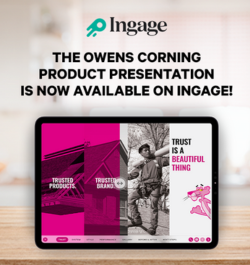





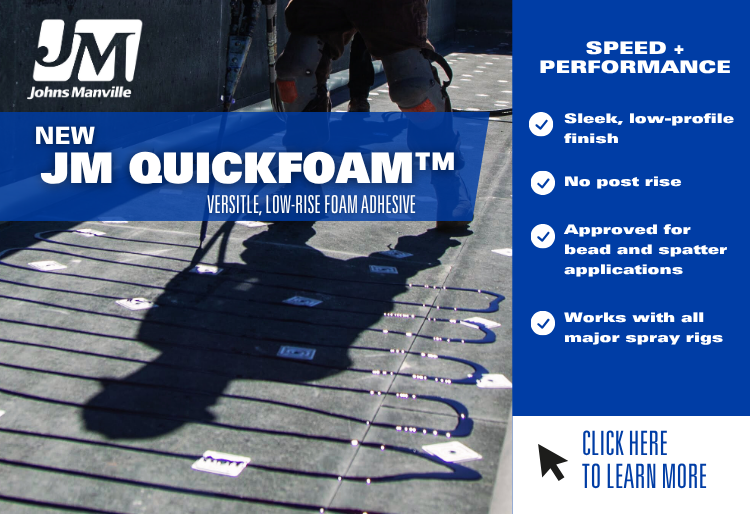



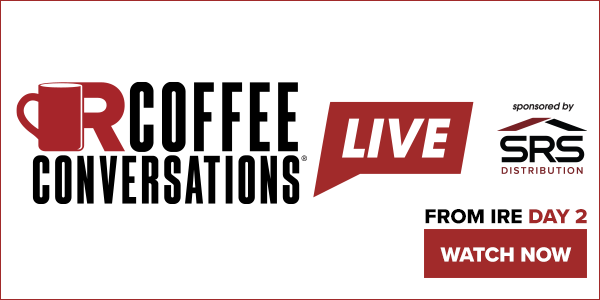
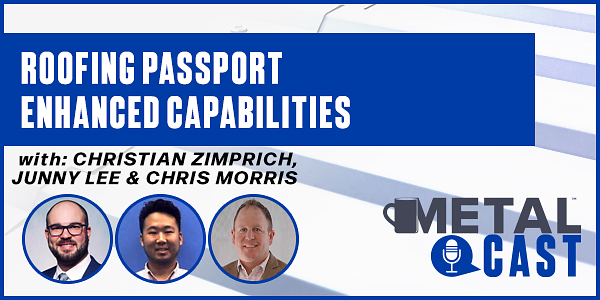
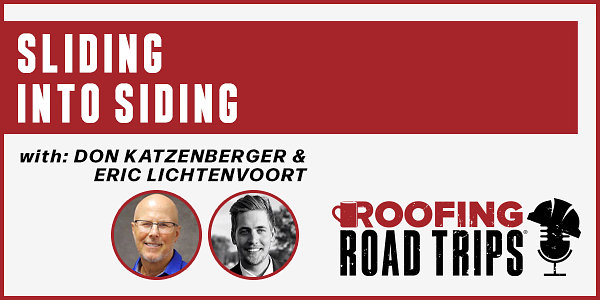


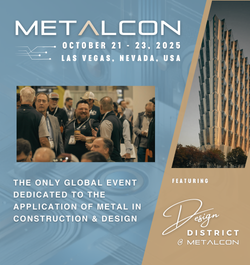

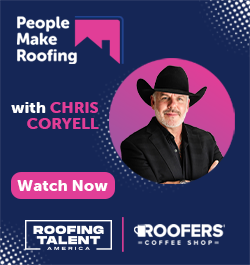
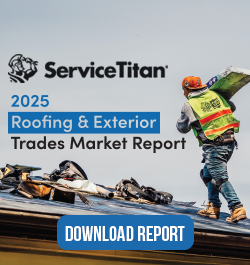
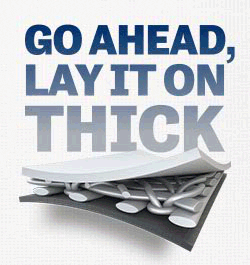
Comments
Leave a Reply
Have an account? Login to leave a comment!
Sign In